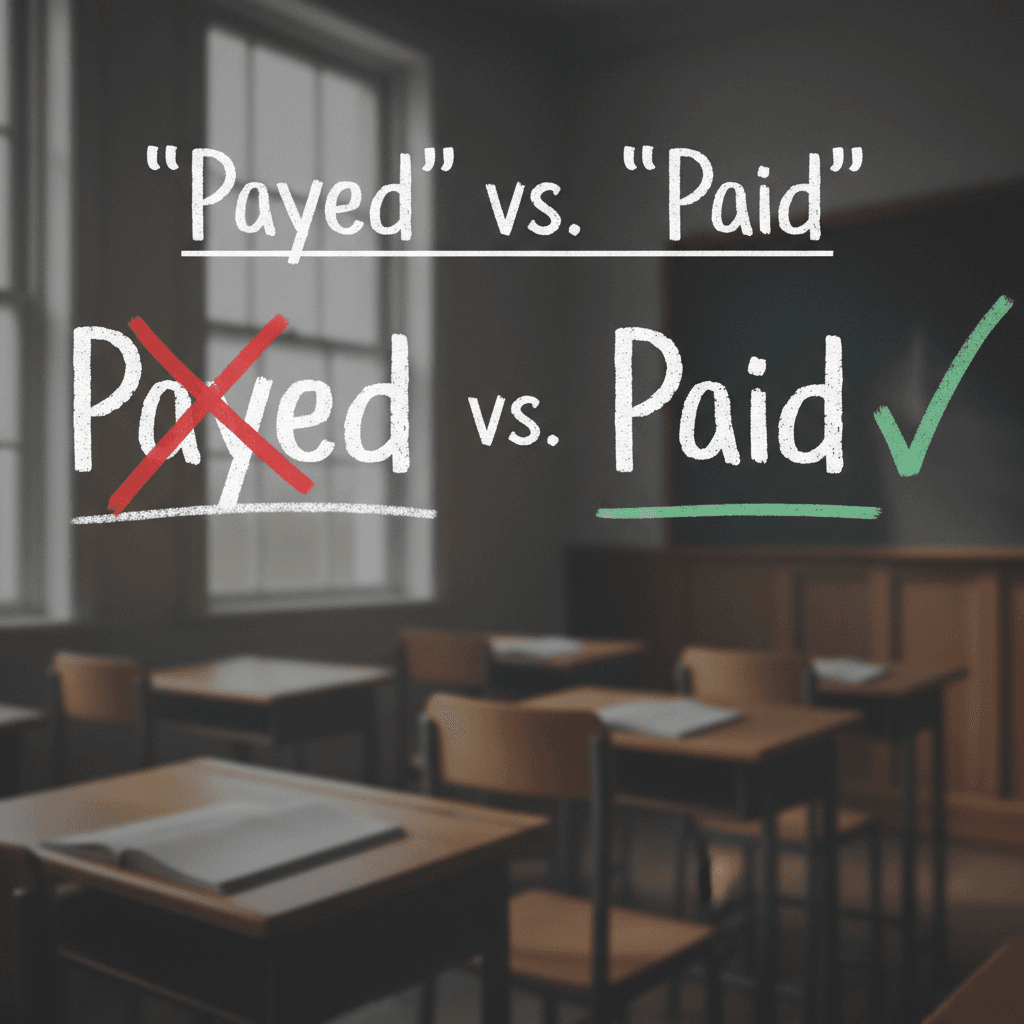Payed vs. Paid: What’s the Difference?
 The words payed and paid look similar because both come from the verb “to pay.”
The words payed and paid look similar because both come from the verb “to pay.”
However, only paid is correct in almost all modern uses — payed has a very specific and rare meaning.
Let’s look at when to use each.
Paid: The Correct Past Tense of “Pay”
Meaning
“Paid” is the standard past tense and past participle of pay.
You use it when talking about money, debt, or reward — basically anything involving a payment.
Examples (10 total)
- I paid the bill yesterday.
- She paid $10 for that book.
- They paid their rent on time.
- We paid our employees early this month.
- He paid for his mistake dearly. (figurative)
- I’ve already paid the ticket.
- She paid him back the money she owed.
- We paid extra for express shipping.
- He paid no attention to the warning. (figurative)
- The company paid its taxes before the deadline.
🧠 Tip:
If money, attention, or effort is involved — paid is always right.
Payed: A Rare Nautical Term
Meaning
“Payed” (with an -ed) is almost never used outside sailing or shipbuilding.
It means to cover or seal a ship’s seams with tar, pitch, or another substance to make it watertight.
Examples (5 total)
- The sailor payed the deck with tar.
- The hull was payed to prevent leaking.
- They payed the seams of the ship carefully.
- The rope was payed out slowly into the water.
- The workers payed the joints with grease.
📘 Note:
This meaning is technical and nautical — you’ll rarely see it unless you’re reading about ships or old sailing texts.
Quick Comparison Table
| Word | Meaning | Use | Example |
|---|---|---|---|
| Paid | Gave money or settled something | Everyday English | I paid the bill. |
| Payed | Coated or sealed (nautical term) | Very rare | The sailor payed the seams with tar. |
How to Remember the Difference
👉 Paid = Money 💰
👉 Payed = Ships 🚢
💡 Memory Trick:
If it’s about payment, use paid.
If it’s about boats, you might need payed.
Common Mistakes
❌ I payed my taxes yesterday.
✅ I paid my taxes yesterday.
❌ She has payed the rent.
✅ She has paid the rent.
❌ He payed no attention to the warning.
✅ He paid no attention to the warning.
Why People Confuse Them
Because both look logical as the past form of pay, many learners assume payed is the regular version.
However, English keeps paid as the official form — payed only survives in nautical jargon.
Even advanced writers can slip up, so tools like Humanizey help detect rare or outdated forms automatically.
FAQs
1. Is “payed” wrong?
Not always — it’s correct only in nautical contexts (e.g., “payed the deck with tar”). In all other cases, use paid.
2. Can I use “payed” in business or daily writing?
No. Always use paid for money or general situations.
3. Is “paid” irregular?
Yes. It doesn’t follow the normal -ed rule — it’s an irregular verb.
4. What about “paying” or “repay”?
Both use paid as the past tense: He repaid the loan. She has paid the fee.
Practice: Choose the Correct Word (“Payed” or “Paid”)
(Answers are listed at the end.)
- She ___ for her groceries at the checkout.
- The sailor ___ the cracks in the boat.
- We already ___ for our tickets online.
- They ___ the price for being careless.
- The workers ___ the ship’s seams with tar.
- He ___ the fine immediately.
- I ___ my debts last month.
- The crew ___ the rope out to sea.
- We ___ extra for priority delivery.
- She ___ no attention to the sign.
Answers
- paid
- payed
- paid
- paid
- payed
- paid
- paid
- payed
- paid
- paid
